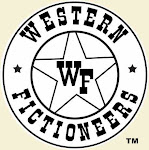Recently,
a friend of mine who drives a truck for a living asked if my stories were
available in audio. Not
only did I tell him no, but I had to admit I'd never really given audio books
much thought.
As a
kid, before falling asleep, I listened to old time radio shows. Gunsmoke,
Escape, and Have Gun, Will Travel were my favorites, but I never made the move
to audio books.
A
quick search at Amazon revealed what I'd been missing. The wide variety of western
titles and authors was encouraging, but when I started to plan my own foray
into audio, enthusiasm turned to worry.
How
much time would it take? How much would it cost? How best to proceed.
I
have a friend who works as a voice professional for radio. Friend or not, his
style had to fit the bill.
Unlike
radio shows, so much has to be conveyed by one voice, the job can be tricky.
With westerns, the tenor immediately sets the tone. Close your eyes and imagine
the voices. Gabby Hayes or Clint Eastwood? John Wayne or Smiley
Burnette? The music: lively or somber? The sound effects? Or lack thereof?
Then,
along with all the technicalities of recording (levels and bit rates), the
legalities of distribution (music and SFX usage rights) and paying for studio
time, we had to crunch some numbers.
I
discovered Audible and their extensive help menus and forums were invaluable. I
contacted our friend Ken Farmer, who produces his own audio works. Finally, I
took the plunge and simply worked through the curve.
"Branham'sDue" may take a while to show a real profit, but it was a real adventure
to produce.
Many
of us Fictioneers have heard our characters come alive via audio. Whether
through Audible's royalty sharing program, our own MP3 files, or a publisher's
arrangement, we're reaching for a new audience and additional revenue.
As I
wrote, Ken Farmer helped me a lot. Ken has four books in his The Nations series
available through Audible/Amazon, and samples are a click away at the link. Ken
says the format provides good extra revenue, and I don't doubt it. He narrates
the works himself, and with each story weighing in at 8 to 9 hours, there's
plenty of entertainment there.
On
the other hand, Gordon Rottman's publisher arranged to have The Hardest Ride
recorded. The sample proves narrator James Simenc's voice is perfectly matched
to the story. Again, that's something to
watch out...er, listen for. In this
case, Simenc needed to read a part of the book that had a lot of Spanish
in it. Gordo wrote to me:
As the POV was
a Texas cowpoke, he didn't have to be native-level Spanish, but he needed to
pronounce it well enough to be understandable to a Spanish-speaker and not
mangle it. He turned out to be able to rattle it off very well. That's an
important consideration for a narrator if there are even small bits of another
language.
Georgia
Woods of Hartwood Publishing has these suggestions if you attempt to go it
alone:
In
general, if you’ve never listened to audio books, you won’t know what to look
for in a narrator or in general when it comes to how it should sound.
Also, you have to understand how the contract works, how the recordings work,
and how to tell the narrator what’s wrong as well as being able to sit and
listen at the computer and give timestamp information for every error.
It’s quite time-consuming, to be honest, so we don’t do it with books we don’t
feel we can profit on, for sure.
Audible
can help.
Mike
Long let them pair his novel, No Good Like It Is, with narrator Keith Newbill.
Mike and Keith both market the story and have also thought more about getting
the book into the hands of professional drivers, maybe on CDs.
Dusty
Richards' publisher produced CDs of his Chet Byrnes stories and, unlike the
examples above, went all out in old time radio style with multiple actors,
music and sound effects.
Finally,
Marc Cameron and L.J. Martin worked with Books In Motion to market their books
as recordings. Larry says publisher Gary Chandler will accept original
manuscripts and non-exclusive work. He adds:
They are a GREAT company,
honest, and super to work with.
In
this new world of digital publishing, where the western is ubiquitous as ever,
yet strangely invisible to the general public, I think audio books offer a good
avenue to reach our audience.
Uniquely
able to find markets that movies or television can't, mp3 downloads or CD
recordings can get our stories and names in front of new ears --something that
just might translate into new eyes and new book revenues in the future.
After
growing up on a Nebraska farm, Richard Prosch worked as a professional
writer, artist, and teacher in Wyoming, South Carolina, and Missouri.
His western crime fiction captures the fleeting history and lonely
frontier stories of his youth where characters aren’t always what they
seem, and the windburned landscapes are filled with swift, deadly
danger. Read more at www.RichardProsch.com






I second the motion re Books In Motion. I have dealt with them for years and could not be happier. They are a class act.
ReplyDeleteGood stuff, Richard. actor/author Alex Cord and I were discussing this very thing a couple of days ago. One of the key things to narrating for an audio book is to be a good oral storyteller.
ReplyDeleteAs professional actors, we have a bit of an advantage as narrators are also called...voice actors. If you aren't accustomed to creating multiple character voices...both male and female...it's best to hire a professional.
I've just started teaching six hour Audio Book workshops for both authors and actors. Got one coming up in July. My blog coming up the third Thursday of this month will be on Storytelling Redeaux.